Click here for Exit the Cuckoo's Nest's posting standards and aims.
Click here to sign the People's Proclamation and send it to everyone you know.
Source: Winter Oak
WALKING WITH GOATS: THE SOFTLY CLOSING GATE
by our regular guest columnist Walking With Goats
There are two types of people in this world, a man I was working with once told me: hill dwellers and valley dwellers. He placed himself, of course, in the former category. Hill dwellers have little gladness to dwell upon but hard-won pride.
We made a festival together for a while. He dedicated his life – as many of us did then – to such endeavours. And every winter, in the very highest storm, he would take his lights and music and his huge cargo netting into the remote Welsh hills and string a carnival up inside the threat and sway of the trees. Storm parties were his offering for luck in the coming year.
The view from this hill is so frequently beautiful – stationed as it is above the surface of the mist that severs our world from that of our surrounding valley dwellers – but it is also in the path of the storm. I left it, in my wilful way, at seventeen for all the urban and urbane that I could grab. Growing up with no flush toilet in the late 20th century will enamour a girl to the cosmopolitan life. My reestablishment here upon it though – with its cleft valley view of the rising run – has transpired into a far more wilful act.
I have had to gather my willpower a good deal over the last few weeks particularly, but it’s a timely topic for all human beings all over the world. As the banks start to issue chirpy “Nobody Panic!” messages and we see the shape of CBDCs begin to darken our horizon lines, the concept of free will is one that’s well worth turning over.
Baby goats are wilful. Vehemently, innately wilful. In groups, their collective will swerves away from any rules based order with the repulsion of an opposing magnetic dipole. There’s nothing you – nor they – can do about it.
They must jump, and they must jump as high as possible, and they must jump over a fence or onto a roof or with the aim of landing atop a windowsill or – if you’re there – perhaps your shoulder blades. A compressed spring inhabits their physical soul.
And, as they grow older and come to occupy their full stature, goats will – as I’ve described before – do absolutely anything they can to disobey you. Such creatures are my livestock of choice. For I am a hill dweller, goatlike in more than just scent. Whatever you tell to me to do, I won’t, on principle.
And now is the moment for every one of us to become goatlike, and to dubiously examine the valley that lies ahead. There’s little time left to scan for alternative routes. The Spotification of our mental provinces already having softened hitherto distinct terrain, we absolutely must jump clear of it.
Shall we hold hands?
I’m quite used to mud.
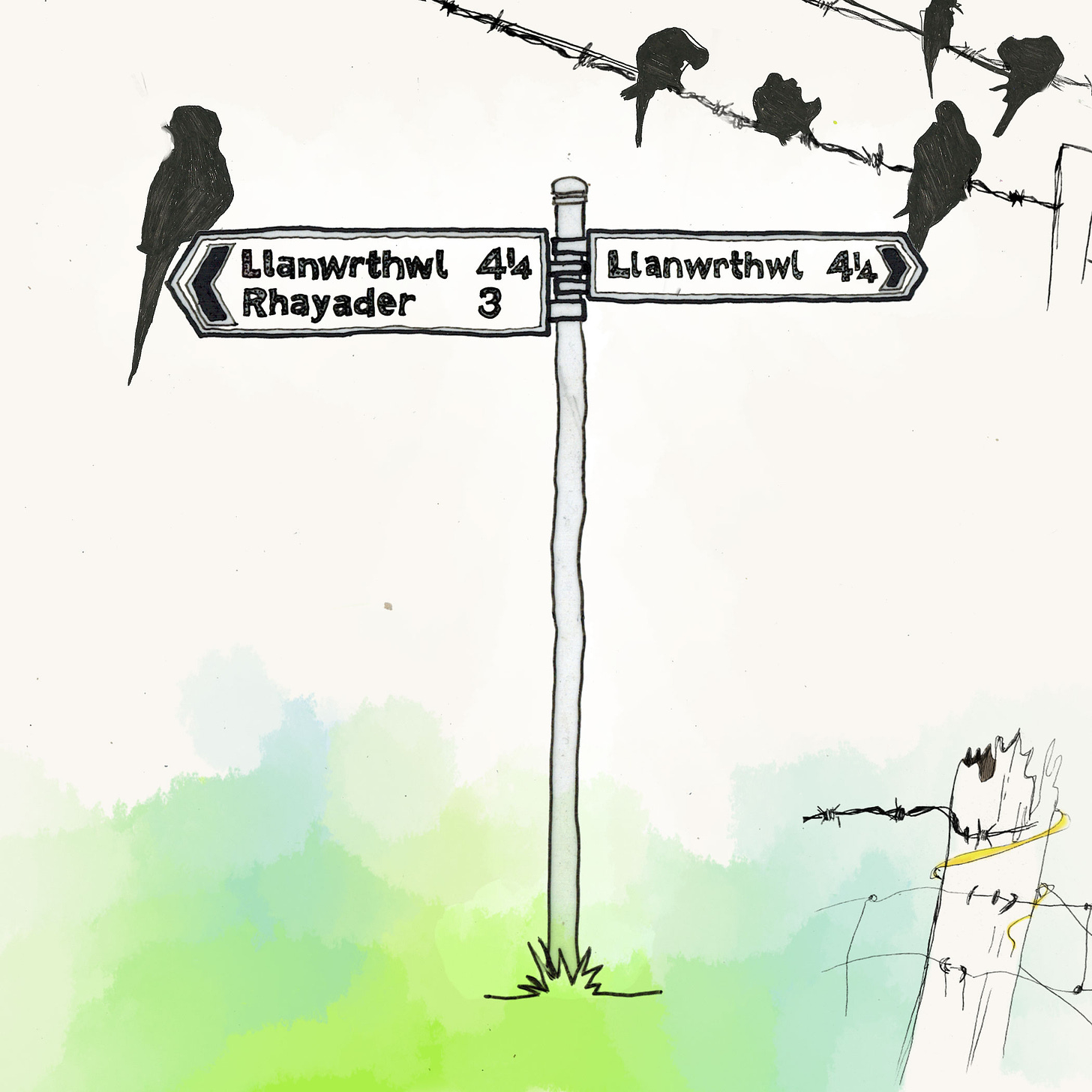
‘Cognitive liberty’ is not a phrase that you hear bandied around a lot in farming communities, despite how popular it’s becoming in places like San Fransisco Bay. Lack of mention, however, should not be taken as nonexistence. When you live with animals, the wisdom of their ways must by necessity become your own. Nameless, a thing may still be safely avoided. An inexplicable, incongruous object on familiar ground will, in fact, emit its own wide berth. So it is with Nina Farahany’s ideas.
Watching her speech to Davos under the breathless ministrations of The Atlantic’s CEO, you’ll notice how few farmers there are sitting in the crowd. That’s because cognitive liberty isn’t a thing we seek.
I would say it perhaps, as a goatlike hill dweller, but the toughness of this life itself gifts that kind of freedom.
While my life of goat-headedness does not always see me physically well, the reward it bestows is a centre for my own personal solar system: the sense that I am in the right place.
It’s true that when I visit Co Op – as I do on occasion for red wine – I notice that everybody else is chest infection free there.
“What’s caused that then?” the uniformed human behind the till will kindly ask, (once I’ve located them in aisle 4 and asked them wheezily to operate it for me, old-fashioned style).
“The weather, the work, the hay, a little bit of all of it I expect.”
And what I do not add is “stress.”
But it is worth it. Even with all the above – I can now say, on the cusp of May – it really is.
Disease forced change this spring – coccidiosis – and no one knew where to go. One late snow, that made a 48 hour stint for the flock indoors a necessity, and everything I’d constructed over the last three years lay useless. Habits carefully nurtured, infrastructure honed, behaviour – paths, calls and responses well-polished – were all nullified. The Darlings shouted misery. Between our gardens, the temporarily erected pens served only intermittently and with confusion. There were escapes and chases, things destroyed, and all through rain and sickness.
March was characterised entirely by rain – organised, careerist rain – and by baby goat diarrhoea. I spent it envisioning my magnum opus, 1001 Ways for a Human to Interact With Mud, and I thought a lot about pity.
I thought about pity at 6.15 am, sitting under rain, in mud, washing the bottom of our weakest billy kid – Griff – for something like the sixtieth time. I thought, as he looked round at me and began to like himself again for the day, that pity was sculpted from mires such as this, always, by the force of human choice.
The male child of a milking mother is not considered, in many realms, to be a life worth saving and Griff – refusing to feed for his first few days upon the earth – had taken a lot of convincing to even seem to want to live.
“Griffin nice clean bum now,” I stroked his nose and said.
So it is that this episode of Walking With Goats is offered as a celebration of life’s junctions. Of our ability to choose which path we tread.

I’ve been lucky enough to live a lot of different lives over the years – but I never did feel like I was in the right place. My view has overlooked the rising spires of financial districts. I’ve slept on the lino floors of derelict buildings with lifelong squatters. I’ve been plied with free champagne in the discreet downlighting of Soho members clubs and smoked spliffs in South African townships. Such is the dubious privilege of the hippy child, to fit into any milieu yet be at home in none. I spent my first two decades of adulthood chasing lives that weren’t mine.
And then I would run away. Two years perhaps, or three, and I’d pack a bag and leave it all behind. There was no life that fitted itself across the map inside me. I must have seemed wilful, I suppose, driven by change.
But this is what I want to say about free will – it’s not what I expected. To my great surprise, it’s not embodied by action at all. In the midst of the concentric circles of farming, of the seasons, the days and nights, the exhaustion and stress and cold, without much ability to action choice at all I’ve found my willpower coalesce by remaining still.
I was pitiable – and eventually self-pitying – by the early part of April, ground down by the never-ending shit and failure. There are only so many consecutive dawns one can spend washing diarrhoea into mud without feeling a reduction in spirit. I managed the monthlong milestone then experienced rapid decline. The fact that it was at this precise point in the emotional curvature that Griff began to ‘resolve’ did nothing for the turbulence that had become my own and the flock’s New Normal. Usurping all other forms of order to conquer and lay waste to our lives, the diarrhoea timetable had made itself our king.
Kama was housed in temporary stabling in the barn with her two precious doe kids, Hua and Petal, sequestered from potential contagion. Thorne, meanwhile, mother to the viscerally unappealing Griff, became convinced that her sister’s amenities now trumped her own. As Queen, there could be only one response to this: violence. Kama ceased wanting to be taken quietly to the barn each night after Hua and Petal’s last feed so that I might avail myself of her morning milk. Kama wasn’t going anywhere near her viciously jealous sister. And as the period culminated unsurprisingly in my own drastic, wet coughing sickness, Mid Wales gifting us yet another performative display of what it’s made of (ice-filth), my daily trophy of milk – the small, unsullied centre of this disharmony – asserted its halo in silence on the kitchen counter by seven each morning, as if in negative space.
Surely, it asked, I cannot be what all this is for?
There it was: the freedom of my will.
It’s been an epic campaign – the colonisation of humanity’s free will over the centuries – and now that it’s reaching its conclusion, the outlines of its strategic fronts have become far more visible. We can trace them clearly as they surface across our world.
‘Brain transparency’ – the future that Farahany tells us has arrived – uses wearable devices such as earbuds or, if we’re feeling unselfconscious, a space age Alice band, to decode our brainwaves via AI. The whole presentation is worth your time but I would certainly recommend the five minute cartoon with which it opens. Cartoon emotions induce minimal empathy – and therefore fear.
‘What you think, what you feel, it’s all data,’ Farahany assures us. She’s excited about it and we don’t need to monitor her earbuds to tell. Beneath the sniper-bedecked turrets, in the presentation suites of Switzerland, she’s reassuringly convinced that the luminaries that comprise her audience will prevent it from becoming ‘the most oppressive technology ever introduced on a widescale.’
Sitting by the wayside on my stool, trying to find a way to talk to you about the profound and painful implications of such technologies, unfortunately the goats can see my weakness. In my dungarees, the old tin can of Yummy One which I use to tempt and bribe them – my only way to restrain their will – is far more easily accessible when I’m holding the unfathomable objects of book and pen. Why I’d make myself weak with such paraphernalia is irrelevant to them. I am penetrable – buffeted from side to side by powerful noses. Thorne is particularly keen on shunting the pen itself. She can see it houses the concentration of my effort. Kama takes a broader sweep and barges me from behind to upend the entire stool. It’s impossible for me to retain my own will, or develop my thinking, under such conditions.
Now that the diarrhoea timetable is stepping down from the throne – and in fact, with suspicious synchronicity, King Charles is stepping up – I have some time to assess the exchange I’ve made in the name of willpower.
There’s been a great deal of crying. There always is in spring. 7am until 10 at night is built entirely of hard physical labour. Sisyphus was working in the sun and I am not. Often I’m not quite sure why I am doing this.
I said to Fran, that it’s like a Ven diagram, which is slowly coming into focus as a single circle and I am at the centre. Sometimes I worry that I’m simply trying to prove I have a right to exist.
I never used to be this way. Hollywood movies entertained me. I went to parties and gave a shit about what I wore. But I don’t think anyone who held out through 2021 did so without becoming radicalised.
If I have the willpower to create autonomy over my subsistence then I can have autonomy of moral code.
“Is there any banks in Wales anymore?” my daughter asked recently.
We’d been talking – as many people must be by this point, in their own ways – about financial crises. It was natural to her of course, to see the closure of our local banks’ branches and cash machines as a sign of the evaporation of their actual funds. We can all find ourselves, sometimes, thinking in the natural way.
I found it difficult to explain – that the money still existed, while mostly never having existed in the first place. That they’d made too much of it, so that when people wanted to see it, it disappeared. That the dissipation of our ability to access it was not the same as its dissipation – though both were happening. Personally, I’ve never quite understood how money works. I’ve tried reading Luxemburg, I’ve had a go at Marx and Keynes and Smith. The ‘science’ of economics, which maps numerical fluctuations over the shifts and rejoinders of human action, tends to leave my cognitive processes flapping like rags in the stream. I’ve mentioned before, though, what I believe: that land is food is life is thought. Sometimes I think that all things are subject to the same force.
You can make out its action through the lens of farming, as well as economics, or human knowledge. On our walk, the goats and I take a higher aspect of the eastern valley view. Wales’ hillsides were forested until the Bronze Age, and then lay subject to the patterns of enclosure still drawn across them in the inky hedgerows now. Between, like nodes upon this map, intensive barns have sprouted up. Chicken farms. Powys has the most per acre in the world I’ve heard. And I think: it’s like coagulation. Inevitable. A slow beading and pooling of industry, drawing industry unto itself. A gravitational force, of mass to mass, capital to capital.
There’s a lot of talk about capitalism and communism at the moment and which of them has been responsible for the most misery. Stakeholder capitalism is coming next though. Whichever way we choose to characterise its new numerical map of power, it will be written in CBDCs. Universal Basic Income will arrive that way – even Yanis Varakouvis says so. It will be fair because someone else will decide how it can be spent. It won’t disappear, because it will never have been there. The world will have universal welfare, and be super productive, but without any jobs. We’ll all be fed, though these farms won’t be here.
The gravitational concentration of money and effort and mechanisation acts upon our world – yet leaves it empty. A strange inversion.
I’m Luddite though. I have chosen to resist this gravity of progress. Everything in my life which was once easy, I’ve made hard.
We live in a world of strange inversions.
George Monbiot’s really into GM lab-farms now.
There have been a lot of incremental gains – I do try to focus on them. This year, my cheesemaking skills have definitely improved and the fridge isn’t full of mouldy things that are covered in wax but still smell like ammonia. There’s milk enough for good cheddar (geddar), halloumi (galloumi), yogurt (I really don’t know how to amalgamate this word with goat) and my daughter’s obligatory morning pancakes.
But the work is beyond comprehension. It uses every hour that every one of us has to give. My mother’s in charge of raising the plants; a line of work which then branches out to occupy my own and Fran’s summer beds. Woef – my other life partner – has many specialisms but I can note in particular fencing, roofing, flooring, drainage, sausage manufacture, braying hides, building all kinds of house (human, animal, tree). Fran has requisitioned other people’s gardens and greenhouses in order to widen the footprint of our permaculture system – and we are still, in year number four, nowhere near the goal of genuine self-sufficiency. Spring seems a season carved from our collective will.
In the park, a lot of people are eating fish and chips at the moment – and it’s fucking great. You can see they’re having an absolute ball. They’re even playing ball games.
Why? the new full moon inside the jug asks me each morning.
Serving up goats milk pancakes to my daughter’s recent sleepover friends, I bemoaned the day ahead. I really, really, really didn’t want to go outside and put in fence posts in the rain – not with bronchitis that wished to become pneumonia.
“Wouldn’t it be great if it was just like Minecraft?” they said.
Inversion, Fran and I repeat to one another. We bought our children Lego, so that they could learn how to create complex structures, but instead the Lego has restructured them.
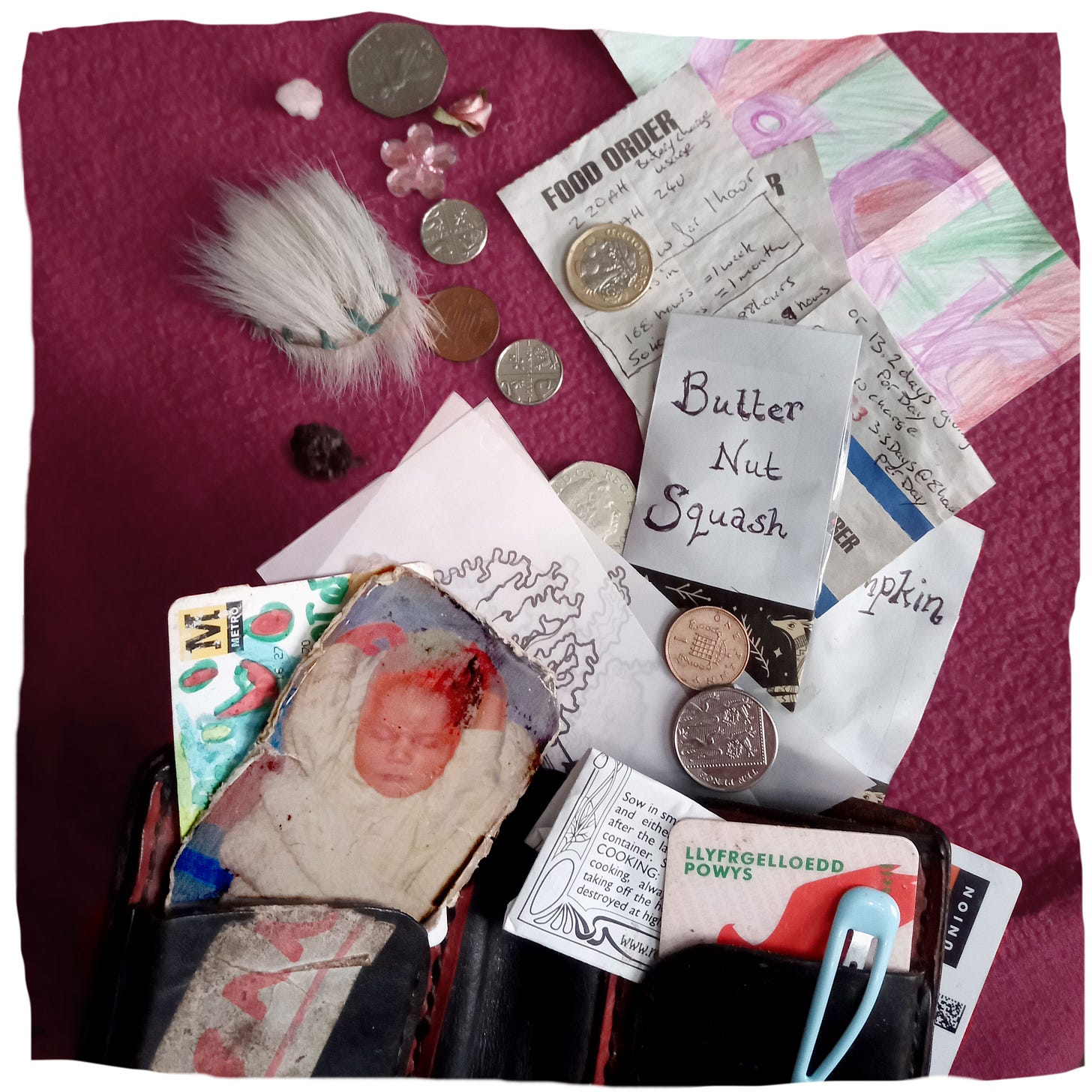
Dostoevsky mapped out the future that we have now arrived at with precision in Ivan Karamazov’s prophetic tale-within-a-tale The Grand Inquisitor, but because more than twenty five of Dostoevsky’s words at a time is like reading spaghetti, I really feel I ought to paraphrase.
“A few centuries hence… the whole of mankind will have proclaimed in its wisdom and through its mouthpiece, Science, that there is no more crime, hence no more sin on earth, but only hungry people… ‘Enslave, but feed us!’ they will cry.
“Man has no greater anxiety in life than to find some one to whom he can make over that gift of freedom with which the unfortunate creature is born… Receiving their bread from us, they will clearly see that we take the bread from them, the bread made by their own hands, but to give it back to them in equal shares and that without any miracle… Yes; we will make them work like slaves, but during their recreation hours they shall have an innocent child-like life, full of play and merry laughter.
… All, all will they lay down at our feet… as it will deliver them from their greatest anxiety and torture—that of having to decide freely for themselves.”
Just so you know, the guy Dostoevsky has mouth these words is the Grand Inquisitor himself – and the Grand Inquisitor’s a Satanist masquerading as a Christian.
Just saying.
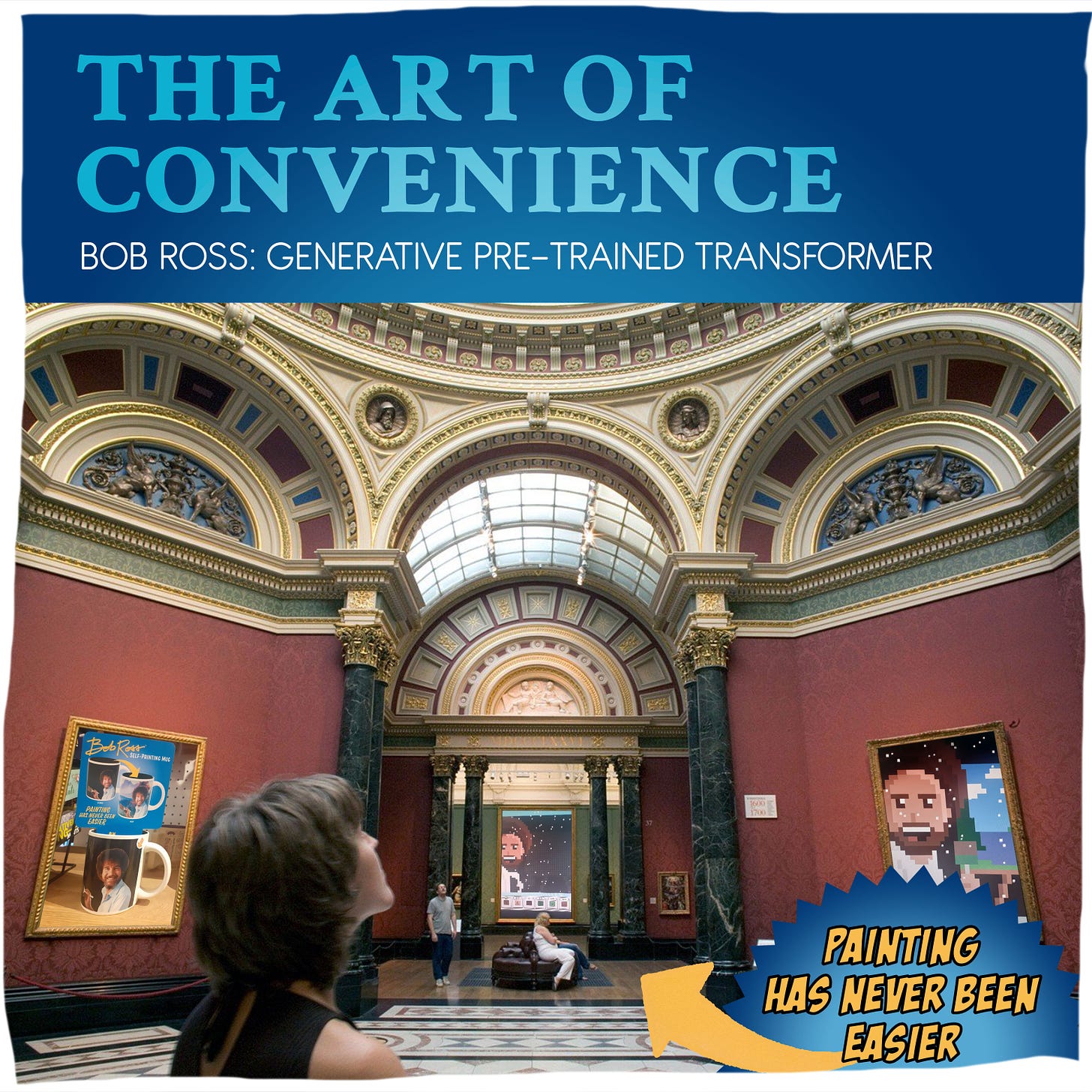
The soft close is a sales technique that builds upon low friction commitment to guarantee that the deal is landed – and that the sales rep wins.
Fran had someone leave a coronation cup on her doorstep recently, just in time for the build up to the big event.
There’s a lot of meaning to drinking from the cup of the king. I suggest you research it.
Although googling keywords such as ‘The Pelagian Controversy’, ‘Semi-Pelagianism’ and ‘Pelagius the Heresiarch’ is guaranteed to bring you into contact with some of the worst television you’ve ever seen, any interest in the history of free will makes it a valuable way to spend time. It’s been absolutely ages that the moral authorities of our world have been trying to tell us that our willpower doesn’t really have any freedom.
Pelagius was doing his thing around 380AD. The pictures of him online are quite flattering, but if you read up you’ll find that his ascetic lifestyle did not in fact result in the chiselled jawline committed to Google’s memory. Pelagius, like all truly great thinkers, was Welsh – and like most Welshmen he was capable of a sturdy build on meagre rations. Moving at the ‘stately pace of a tortoise’, such that he was able to develop fat ‘even upon his forehead’, Pelagius (or as he was called round here ‘Morgan’) was to construct the greatest challenge to Augustine’s doctrine of squirming servile sinfulness that the Christian church would see for 1500 years.
Man, Pelagius said, was in charge of whether or not he sinned. Adam’s moment of weakness hadn’t made all unbaptised babies limbs of Satan. We could choose whether we would be good or bad – upon the altars of our own conscience.
It took everything the church could throw at him to bring Pelagius down. Even after his condemnation for heresy – in fact long, long after – Semi-Pelagianism remained, as people continued dangerously flirting with the idea that they were in charge of their own morality.
Free will is like that. It keeps coming back for more.
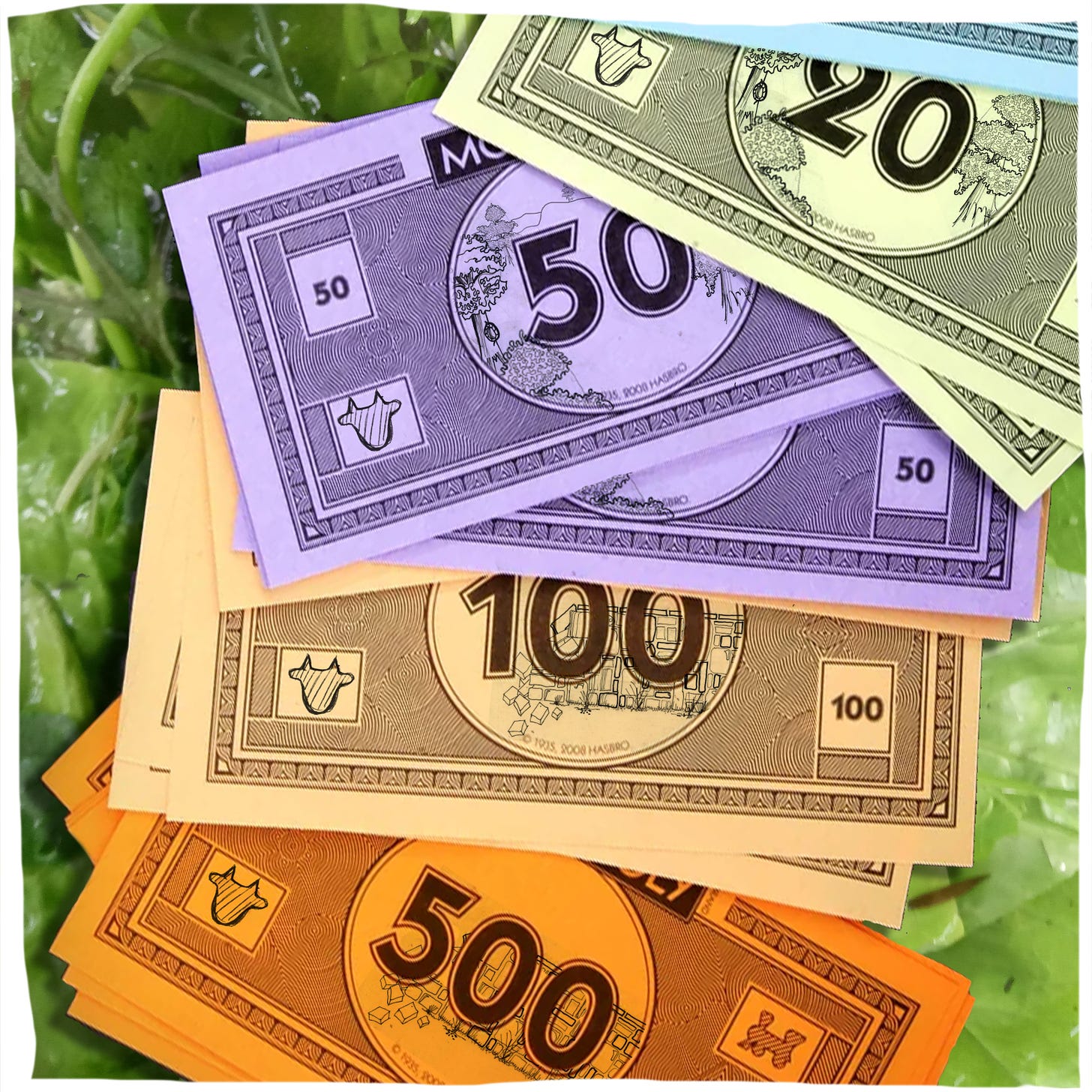
April, to my deep surprise, offered just as much faeces and freezing rain as March. The sky glowered with a hue similar to the alluvial slime excavated from a crisis ditching of the soakaway of our septic tank; a task that I was incredulous to see replace the diarrhoea timetable. I thought often that week of the cosmopolitan life and ruminated grimly on swiftly approaching, even less soluble problems.
The grass will not grow under seven degrees. Forced by such unrelenting Mid Walean temperatures to walk my sheep as well as my goats, I would have no choice but to reduce the flock to those who could be relied upon to remain by my side and more – to follow me back into the barren field at the end of their wander through the lush paradise of the byways and hedgerows that they had so recently browsed.
It takes a great deal of trust for an animal to return to a bare enclosure and see you lock the gate believing you will allow them out again. Lucy knows this – and she is right. But the other ewes – Magda, Ottie and Lottie – were sensible really, to refuse.
There’s such a lot of choice for us to browse these days, it’s almost overwhelming. It would be easy to think you were exercising your free will a hundred times before breakfast with nothing more than a swipe of your right thumb.
And that’s nothing in comparison to what’s coming next.
Humane AI is the generously titled new wearable assistant that was launched this month, with a cool blue glowing read-out that makes the palm of your hand into Ryan Gosling’s and all kinds of different applications for its superior knowledge. It can, for example, scan an item of food and tell you if its ingredients are suitable for your precision health profile.
At this point though – its makers are pained to point out – you can eat it either way.
I wrote a book once, about a man who’d had his status as a citizen – and therefore all his choices – taken away. Outside the realm of the society he’d known, he sat down on the pavement and refused to go on.
These were the notes that I made for the ending, as he looked at the rush of human progress that he was no longer a part of:
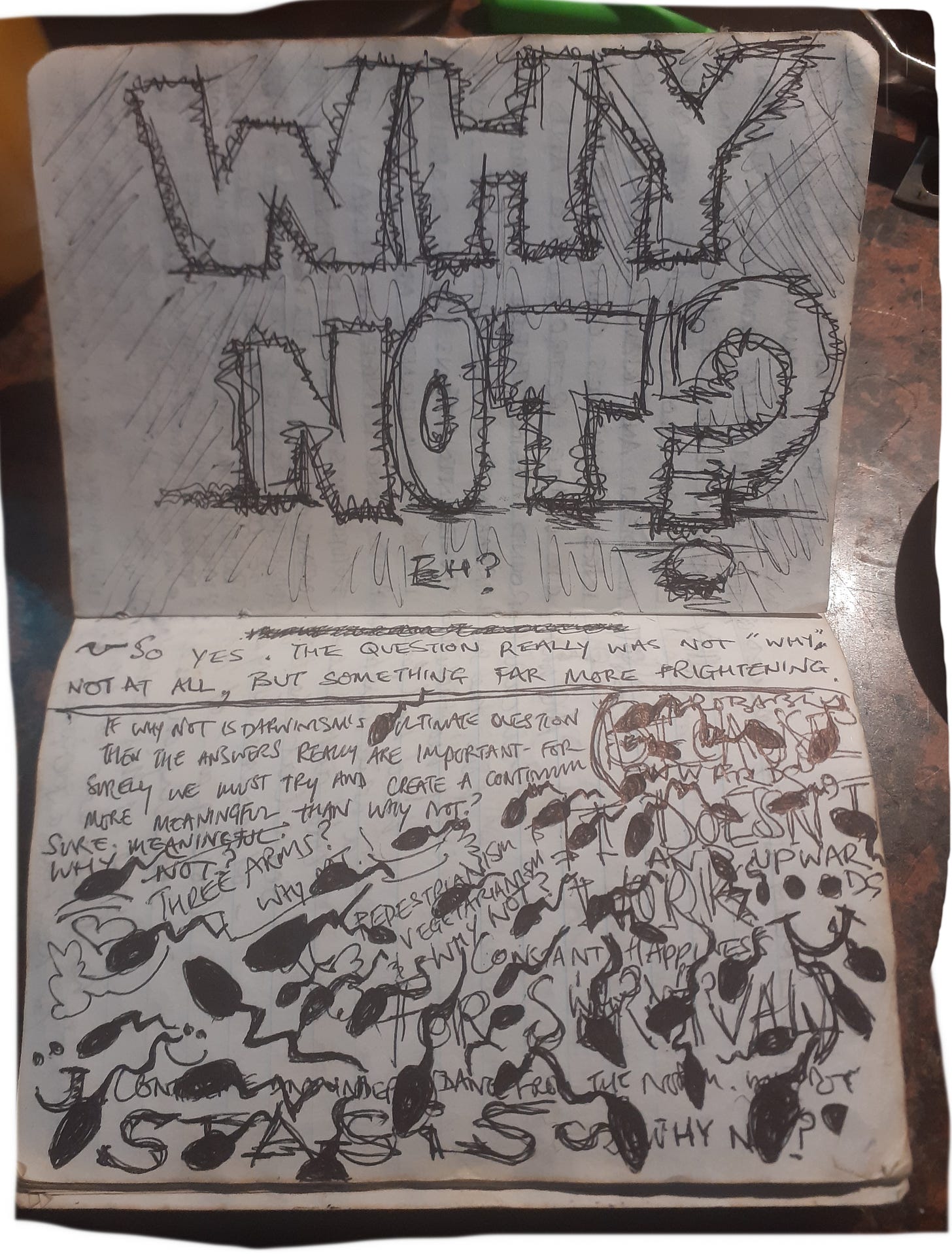
I was looking for meaning then. Darwin didn’t do it for me.
This human ‘progress’ – the unremitting forward-thrust most children of the 20th and 21st centuries have been schooled to believe is impervious to free will – gave inadequate answer to my question. The selfish gene, we’re taught – innate and inevitable – dominates all life, and ineffectiveness is its only counterbalance.
Even if we try to be good, we are evil, we’ve been told. Programmed to consume our way into oblivion. Far from a gradual enlightenment, human advancement embodies a colonial scramble towards our own and the planet’s destruction. Unless, of course, a higher policy maker saves us from ourselves.
I don’t believe it though. That’s the thing. I think that such a message is designed explicitly to prevent the most powerful of human progressions from becoming possible. It’s designed to prevent the evolution of our free will.
Without wanting to justify a life that’s brought me near to my own destruction, I’ve become convinced that at its centre lies a profound truth. If we can discover the outline of what it costs for us to live, and meet it with our own willpower, I believe we’ll find we’re very close to a state of grace.
The gates are closing though.
‘Cognitive liberty’ will be enshrined in such pervasive surveillance (our brainwaves available to the police, Farahany mentions in passing, as well as our employers,) that it will be hard for us to even grasp what we have lost.
Letting our AIs cue our favourite playlists at moments that they deem are meaningful, and gifted a ‘new form of control’ to swipe or text with just our thoughts, the transparency of our brain metrics, we’re told, will earn us performance bonuses. And in order to avoid dystopia, we could simply have the technology ‘placed in our own hands.’ We could choose to wear the attractively knit ‘haptic scarf’ that buzzes every time our thoughts wander away from our work – because it will make us more productive than the girl who refuses.
Our free will eradicated before we’ve even had a chance to understand its shape, we won’t really know what has been taken. Our thoughts nudged and boundaried by the imposition of rules that transgress our bodies, where censorship ends and self-censorship begins will be undetectable. Our children’s generation will have no concept of the sovereignty of their own minds.
And as people took the injections that they were told to take in 2021, abandoning their previous understandings of society for social distancing, so the greater good – of our team, our community or our world – will be offered to us as the reason for our participation in the global mind. Its economy will unified under impact investment and CBDCs. And we won’t remember what it felt like to choose our own interaction with society or sculpt our place within it. What it was like to live unprompted, or by our own moral code.
This process of unification – that will remove individual boundaries, of nation, of personhood, only to replace them with all encompassing ones – it is almost done.
I am not taking part though. Resistance is a natural process too, and I will enact it – here on the hill, with the mud and exhaustion, with the old, breaking fences and their Mid Wales jewels: the tattered black plastic sacks which, caught on their barbed wire hooks, fly their unclaimed flags in a wind that sees no borders.
Images by Francesca Swift and Woef

No comments:
Post a Comment